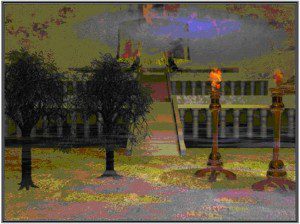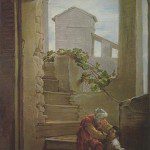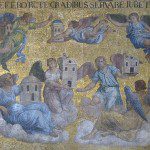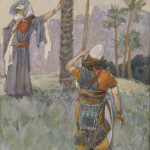 I delivered my final sermon in the Dawson Creek Church of the New Jerusalem this past Sunday. Certainly a bittersweet experience – it was great to give one last sermon in that building, and of course sad to say goodbye (we do have one more service, but it will be an outdoor service at a campground, together with the group from Grande Prairie). It’s been a blessing to serve here. The topic of the sermon was the two essentials of the New Church, as represented by the two witnesses in Revelation 11. If you’re interested, audio from the sermon is available from the New Church Audio website.
I delivered my final sermon in the Dawson Creek Church of the New Jerusalem this past Sunday. Certainly a bittersweet experience – it was great to give one last sermon in that building, and of course sad to say goodbye (we do have one more service, but it will be an outdoor service at a campground, together with the group from Grande Prairie). It’s been a blessing to serve here. The topic of the sermon was the two essentials of the New Church, as represented by the two witnesses in Revelation 11. If you’re interested, audio from the sermon is available from the New Church Audio website.
Readings are Revelation 11, Luke 10:25-28, and Apocalypse Revealed 490 (all of which I highly recommend reading, as the sermon might not make much sense without them).
What is the New Church? It’s a question we might be asking ourselves as we approach the 19th of June, the “birthday” of the church. What does it mean to be a New Churchman or New Churchwoman? In some sense, the answer is complex – to be New Church is to subscribe to the doctrines laid out over dozens of volumes of detailed theology. But in another sense, the New Church is very simple. It boils down to two essentials; and to belong to the New Church is to confess and acknowledge these two essentials in heart and life. As we read in Apocalypse Revealed, the first essential of the New Church is “that the Lord is the God of heaven and earth and that His Human is Divine.” And the second essential of the New Church is “conjunction with the Lord by means of a life in accordance with the precepts of the Ten Commandments” (AR 490).
These two essentials are specific instances of the two commandments that have always been at the heart of every covenant the Lord has made with His people: to love God and to love the neighbour. When the Lord was asked what the greatest commandment in the law was, He replied not with one law, but with two: “Thou shalt love the Lord thy God in thy whole heart, and in thy whole soul, and in thy whole thought. This is the first and great commandment. And the second is like it, Thou shalt love thy neighbour as thyself” (Matthew 22:37-39). Every other commandment is contained in these two, and these two cannot be separated; as the Lord said, on these two commandments “hang all the law and the prophets,” that is, everything in His Word.
But it is vital to note that for the New Church, these teachings are more specific than simply “love God” and “love your neighbour.” In particular, we are called to worship the Lord God Jesus Christ in His Divine Human, and to obey the Ten Commandments. To love God is to worship the Lord Jesus Christ, since He is the only God; and to love the neighbour is to obey the Ten Commandments, since love does not steal from the neighbour, or murder, or commit adultery. To specifically know the Lord God Jesus Christ, and to specifically know how to follow the Ten Commandments, we need the Lord’s Word; and so the book Divine Providence speaks of three essentials of the New Church, adding “an acknowledgement of the holiness of the Word” to the other two, to the acknowledgment of the Lord’s Divinity and the life of charity (DP 259).
The two essentials of the New Church are beautiful ideals. In the description from the passages we read from Revelation, they are said to be two olive trees and two lamp stands. As olive trees, these two witnesses represent love and charity; and as two lamp stands, they represent all understanding and faith – the kind of faith that is fuelled by love to the Lord and love to the neighbour, just as an oil lamp is fuelled by olive oil.
In some ways, it seems that anyone would agree to these two essentials, at least among Christians. Who would deny the importance of loving Jesus? Who would deny that living by the Ten Commandments is a good thing? And yet in the description from Revelation, we find many people who hate the two witnesses. After the two witnesses had prophesied, a beast from the abyss (or bottomless pit) arose and killed them – and while they lay dead, those dwelling in the land rejoiced over their death.
According to Apocalypse Revealed, that beast from the abyss represents in particular the kind of reasoning that was being done at the time by the most learned theologians in the Protestant world, who through clever reasoning had denied that living by the Ten Commandments did anything to conjoin a person with the Lord, and who had separated the Lord’s Divinity and His humanity, thinking of His humanity as no different from our own. They did this with complex theological arguments, and even at Swedenborg’s time, most lay people didn’t even realize that this is what the theologians were teaching, since they seemed to affirm a life according to the commandments. And yet, even today, there are some theologians and church leaders who would condemn the New Church view of the Ten Commandments as “legalistic,” and who would declare the New Church doctrine of the Trinity to be a hellish heresy.
Those theologies and theologians are out there, but in terms of our everyday life they might not have much direct effect on us. But this does not mean we are immune to any ideology that seeks to destroy the Two Essentials. The two witnesses were killed in “the great city that is called Sodom and Egypt.” In the internal sense, Sodom and Egypt refer to the two things that are most antagonistic to the two essentials of the New Church. Sodom represents the love of ruling, or the love of dominion, from self-love, which we might think of as the love of controlling; and Egypt represents pride in one’s own intelligence. Love of ruling from the love of self hates the idea of submitting to the Lord as God; and the pride of our own intelligence combines with that love of self in creating rationalizations for living however we please, despite what the commandments say – creating excuses like, “This isn’t really adultery,” or, “Stealing from these people can’t be bad.”
We all have evil spirits with us trying to stir up that love of dominion and that pride in our own intelligence; and because of this, there will be part of us that hates the two essentials of the New Church. And those evil spirits have allies in the culture around us. Even if we haven’t adopted theological reasonings that deny the two essentials, there are messages both subtle and overt constantly bombarding us that attack those essentials. For example, many people simply assume without question that “no one is able to fulfill the law,” the law in this case meaning the Ten Commandments. And there is some truth to that – none of us is perfect, we are all works in process. And it’s so easy for that to turn into, “As long as I’m generally doing good things, being nice to most people, helping out when I can, I’m fine.” But that’s not what the second essential of the New Church says. The second essential is to live according to the Ten Commandments. That means making them the law of our life – and believing that to break them is to sin against God, and that if we continue to break them, we are choosing an eternal destiny in hell. Here’s the startling teaching: we can fulfill the law, with the Lord’s help, if we correctly understand what it really means to fulfill the law. The apostle Paul is known for his emphasis on salvation by grace; but rather than saying that fulfilling the law is impossible, listen to what he wrote in his letter to the Romans: “Owe no one anything except to love one another, for he who loves another has fulfilled the law. … Love does no harm to a neighbour; therefore love is the fulfillment of the law” (Romans 13:8-10). The Lord enables us to love, and therefore He enables us to fulfill the law.
Now, the Lord knows that we will not be perfected in an instant. And what He cares about is our intentions. But by intentions here we do not mean general wishes and hopes, as we sometimes do when we talk about “good intentions.” Intending to follow the commandments means that we do so whenever we have the opportunity. If we give into an overwhelming temptation, or discover we have sinned in ignorance, we do not excuse it but acknowledge it as evil, and pray to the Lord for help not to do it again. True Christian Religion explains as follows:
Those who by repentance have removed some evils that are sins, come into a settled purpose to believe in the Lord and love the neighbor. Such are kept by the Lord in the purpose to refrain from other evils; and if therefore from ignorance or some over-powerful lust, they are led to commit sin, it is not imputed to them, because they did not commit it deliberately, and do not confirm it in themselves. (TCR 509)
We must not sin deliberately. We must live with the intention of following the commandments, and that means regularly examining our lives, seeing where we tend to sin, praying to the Lord for help, and consciously choosing to flee from those evils we discover – and whatever other evils crop up in our awareness.
Just as there are forces in our culture that encourage is to ignore the Ten Commandments, the second essential, there are forces that encourage us to turn away from the first essential: acknowledging the Lord Jesus Christ as God, and His human as Divine. We see movies and TV shows depicting Jesus as a man like any other; it’s popular in some circles to declare Him a great moral teacher, no different from Buddha or Ghandi. The New Age movement encourages everyone to see themselves as Divine, suggesting that the only difference between Jesus and the rest of us was that He realized the Divinity that was inherent in Himself – when the reality is that there is no greater sin than to worship ourselves as gods. Even outside of New Age thought, our culture as a whole encourages us to come up with our own idea of God – as Mother Nature, or an impersonal force, or whatever else makes the most sense to us. But to embrace this is to create gods for ourselves every bit as much as the literal idolaters did who are condemned so often in the Lord’s Word. To embrace the Lord Jesus Christ as God means to submit our own ideas of what we want God to be like to His revelation of what He is like. You see why this is so antagonistic to our pride in our own intelligence, and why our lust for dominion is so violently opposed to it.
Those forces of society encourage us to reject the Two Essentials of the New Church outright. But there are other more subtle errors that we need to be cautious of as well. The first thing we need to be cautious of is a tendency to raise up a less important teaching above these Two Essentials, making an essential out of something that actually isn’t essential. This is harmful even if that lesser thing is true and good in itself. To take one example: the doctrine that the whole Word is written in correspondences, or symbolic language, is a wonderful teaching; but if we make correspondences more important than loving the Lord and our neighbor, we can abuse them to make the Word say whatever we want. Correspondences must serve to illustrate and confirm those essential teachings.
Or to take another example: the Doctrine of the New Church teaches that if a person is ignorant of the Lord Jesus Christ and strives to serve God and his neighbour according to whatever religion he has, he will be saved, because he will accept the Lord when taught the truth about Him, even if that happens after death. That’s a wonderful teaching – but it is not one of the essentials, and if we raise it up to that level, we can start to think that it really doesn’t matter what kind of idea of God we have, or even whether we believe in God at all. And yet, that directly contradicts the first essential of the New Church: we must acknowledge the Lord Jesus Christ as God to be saved. We are not in ignorance, and if we reject the Lord as God, we close off heaven to ourselves, because to be in heaven is to be in Him and have Him in us.
From these examples we can see the danger of raising up an inessential to a place above the two essentials. There’s one more thing we need to be cautious of, related to this: we need to be careful not to focus on one of the two essentials to the exclusion of the other, or to fall into the mistake of thinking it is even possible to have one without the other. We know from the Lord’s Word that, no matter how much we think we can love God without loving our neighbour, this is simply not the case. In the Gospel of John we read, “He who has My commandments and keeps them, it is he who loves Me.” And a little further on: “This is My commandment, that you love one another as I have loved you” (John 14:21, 15:12). To love on another is to keep the commandment, and to keep the commandment is the only way to love God. In essence, God is love for all the people He has created, and so we only experience who He is if we experience that love for those people.
What is true of the generals – that loving God can’t be separated from loving the neighbour – is true of the specifics as well – that loving the Lord Jesus Christ in His Divine Human cannot be separated from living according to the Ten Commandments. The second essential of the New Church is not simply “to live according to the commandments” – it is conjunction with the Lord by a life according to the Ten Commandments. Following the Ten Commandments – not just in their letter, but in their spirit – is not simply a good idea, or the best way for human society to run. Following the Ten Commandments is spirituality. The Ten Commandments, in fact, describe what it looks like to act in and from God, and in their highest sense, describe how God Himself acts in Human form; and the Lord Jesus Christ is the living embodiment of their truth. To truly know Him, then, we need to live the letter and the spirit of these laws – and to do that, we must turn to Him, and ask Him to live in us, to give us strength to obey. That does not mean that we hang down our hands and hope that He will keep those commandments for us – it means that we keep them with all our strength while acknowledging that it is only the Lord in us who empowers us to keep them, and eventually writes them on our hearts.
Imagine a world where everyone was doing that – where no one was content to continue sinning against his brothers and sisters, where everyone supported each other in shunning evils as sins against the Lord God Jesus Christ. Imagine the love that would reign as people put aside their lust for control and domination. Imagine the peace on earth as people willingly submitted their own ideologies to the Lord’s ideology of mutual love. What you are imagining is the Lord’s kingdom. What are imagining is the New Church – not an organization, not a denomination, but the communion of all those who worship the Lord and obey His commandments, who seek to make the Doctrine of the Holy City a living reality. This is what we pray for when we pray, “Thy kingdom come.” This kingship of the Lord is what the angels celebrated when the seventh trumpet sounded.
We are imagining the Lord’s kingdom over all the earth. But that only happens one person at a time, individual by individual. So start small. Start with yourself. With your family. With this little congregation in Dawson Creek – let’s commit to making those Two Essentials a reality, to bring into the world the worship of the Lord alone and a life according to His commandments. We have all had struggles, and there will be still struggles – the Two Witnesses were put to death and lay dead for days. But they rose again. Over the months, years, and decades ahead, let these essentials be your guiding posts, the witnesses and testimonies that the New Church is here, that the Lord is here. Let us worship the Lord Jesus Christ as the one God of heaven and earth. Let us live by the Ten Commandments, and so be conjoined with Him. And let us rejoice with the angels, witnessing and testifying, that “the kingdoms of the world have become our Lord’s and His Christ’s, and He shall reign for ages of ages.”
(Image is by Douglas W. Krieger; taken from Wikimedia Commons)












